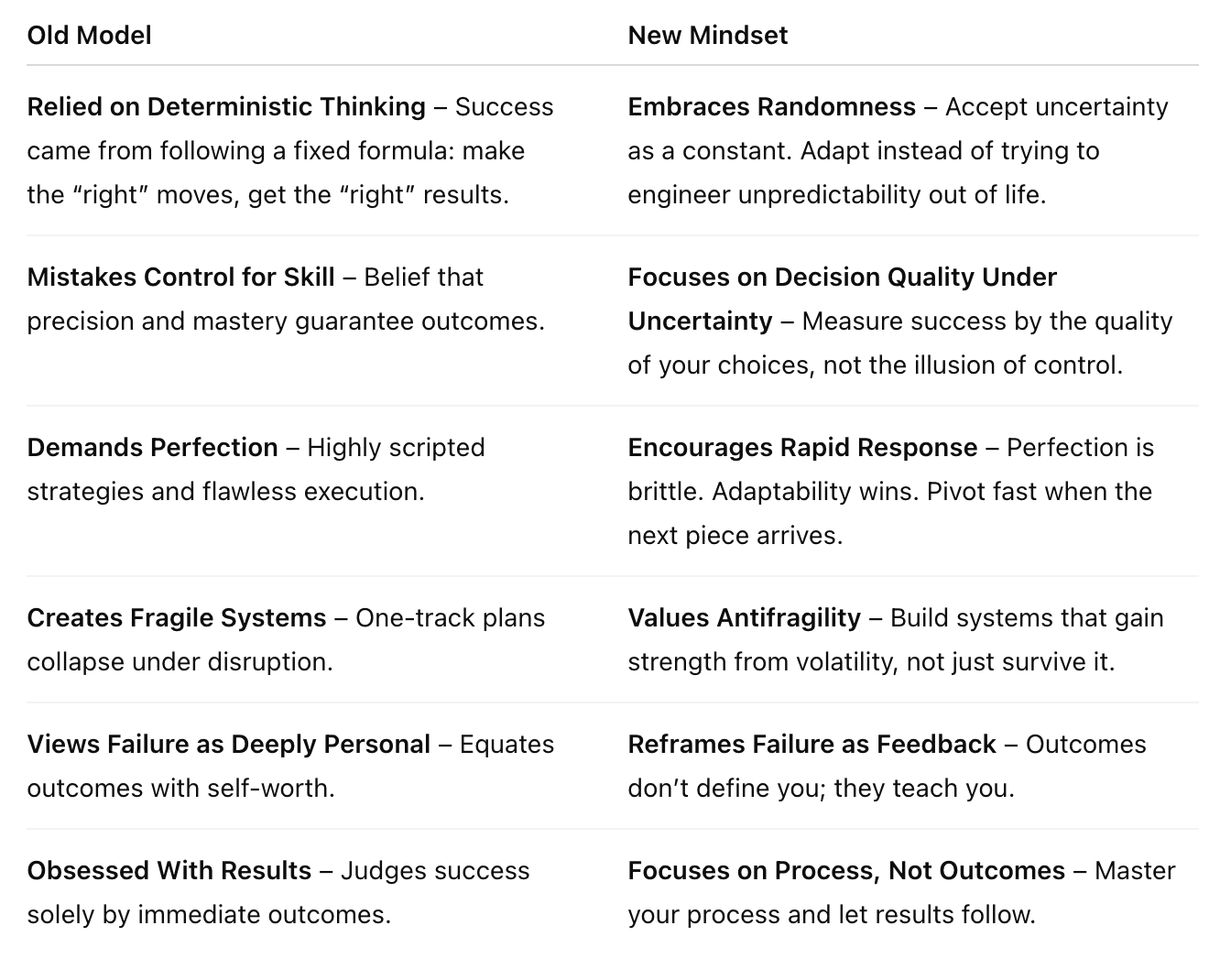P7: Randomness - Life's Tetris, Not Chess
"No matter how sophisticated our choices, how good we are at dominating the odds, randomness will have the last word." – Nassim Taleb
- The Problem → People often fall into the trap of deterministic thinking. They overestimate their ability to control outcomes and underestimate the role of randomness, leaving themselves vulnerable in a world full of nonlinear challenges.
- The Shift → Instead of focusing on predicting and controlling the future, adopt an Agilism mindset. Build flexible systems and focus on making better decisions even when faced with uncertainty.
- The Payoff → By doing this, you’ll become more resilient, stop being so hard on yourself when things don’t go as planned, and develop the ability to adapt and thrive, no matter how unpredictable life becomes.
When Life Drops a Surprise Piece
Sixty-six million years ago, a random asteroid collided with Earth.
No grand plan, no destiny, just a chance event.
It wiped out the dinosaurs and opened the door for mammals. You exist today not because of design, but because of some random piece of rock.
Then there's you! Yes, you!
Of all the genetic combinations possible, out of millions of sperm, eggs, and moments in time, somehow you happened.
Shift the timeline even slightly, and your existence may have been erased.
You’re not the product of flawless strategy. You’re the outcome of countless unpredictable variables aligning in just the right way.
Randomness doesn’t just shape the cosmos; it shows up in our everyday lives.
Harrison Ford, for example, wasn’t seeking stardom. He was fixing a door on a film set when George Lucas happened to ask him to read lines for other actors.
That day, Han Solo was born—not from ambition, but from pure fluke. A career spanning galaxies began with a small favor.
Life isn’t chess. There’s no fixed set of pieces or a clear roadmap. It’s more like Tetris. The next block drops with no warning. You can’t control the sequence; you only get to decide your next move.
And that’s the whole game.
The Blind Spot We All Share
You nailed the job interview—but was it really just your preparation? Maybe the hiring manager had just finished a fantastic espresso, liked your last name, or needed someone on board before Friday.
A startup lands on the front page, hailed as revolutionary—but maybe it hit the algorithm lottery at 2:07 a.m., when everyone online was aimlessly scrolling.
You meet someone at a party. You talk, you connect, you get married. A hundred tiny, invisible factors could’ve kept your paths from crossing entirely.
These moments shape lives in ways that feel profound. And yet, we gloss over how accidental they are.
Here’s the blind spot we don’t like to confront: we massively underestimate the role of randomness.
Think about the birth lottery. You didn’t control the year, place, or social conditions into which you were born, yet these factors set much of the stage for your life.
Or career breaks. Timing, connections, and sheer randomness often outweigh raw talent.
Even relationships rest on fragile odds. One missed train or uninstalled app, and the narrative is completely different.
But instead of recognizing chance for what it is, we cling to tidy stories of effort and merit. These stories give all the credit to skill and intention, leaving little room for serendipity.
These stories are simple. They protect our egos.
Remember Certainia? This is the place where we build our mental models. But Certainia cannot always be the fantasy land where deliberate effort yields predictable outcomes and chess metaphors still work.
As we discussed in the previous Principle, most of the time, we're not living in Certainia. We're in Randomia - a world shaped by falling blocks and random collisions.
In Randomia, randomness isn't a glitch. It's the world you live in most of the time.
Pretend it doesn't exist and your game only gets more difficult!
Why This Matters Now
We’re living in the most interconnected and fast-paced era in history.
A single tweet can tank markets. A small startup can upend a century-old industry in just a few years. A casual coffee chat might spark the next big career move, while a global event could undo years of careful planning overnight.
The old roadmap for success was created for a slower, more predictable world. It was a time when you could follow a straight path from education to retirement with a reasonable expectation that reality would align with your plans.
That world doesn’t exist anymore. Here’s the reality today:
- Random events scale faster. Technology, social media, and global systems mean even small triggers can lead to massive outcomes.
- Black swans aren’t rare anymore. Once-in-a-lifetime events, from pandemics to AI breakthroughs, are now arriving every few years.
- Luck and timing shape outcomes more than effort alone. Hard work still matters, but other factors now play an even larger role.
- Change doesn’t follow a straight line. Progress is messy. Industries evolve unpredictably, and opportunities appear and disappear rapidly.
If you’re ignoring randomness, it’s like sailing through rough waters without a map. You might end up okay for a while, but it’s pure luck if the conditions stay calm.
And these days, they rarely do.
Recognizing and preparing for randomness isn’t just smart. It’s essential. This is a survival skill for thriving in today’s world.
At the core of Agilism, we design adaptable lives, systems, and identities that thrive in both order and chaos. Because whether you like it or not, you’ll need to operate in both “Certainia” and “Randomia” – sometimes within the same day.
Why the Old Model Falls Short
For years, people were taught to approach life as if it were a chess game.
The rules were consistent, the moves predictable, and with enough study, you could plan ahead with confidence. Strategy was king in this world of certainty.
But we don’t live solely in Certainia anymore. Today, we also exist in "Randomia"—a world full of unpredictability, sudden shifts, and chaos.
Here, the board doesn’t sit still. The rules change mid-game. Pieces show up unannounced, and the game itself might disappear without warning. Success in Randomia isn’t about having the perfect strategy. It’s about learning how to adapt and make decisions when everything is uncertain.
The Chessboard Mindset no longer holds up in this environment. Here's why:
1. It Assumes a Predictability That Doesn’t Exist
Chess games work because the rules never change, and both players can see the board in full. Randomia doesn’t follow this logic.
- Markets evolve before you can act.
- Personal crises (like health challenges) can reshape your priorities instantly.
- Stable career paths can vanish without notice.
Operating with a fixed-rule mindset in Randomia leaves you unprepared for sudden shifts.
Agilism, on the other hand, embraces the uncertainty and prepares you to respond quickly.
2. It Links Strategy to Guaranteed Results
In Certainia, good moves almost always produce good results. But in Randomia, there’s no such guarantee.
- Carefully built marketing campaigns may fail.
- Playing it safe can still lead to setbacks.
- Random factors like luck and timing often matter more than skill.
If you judge yourself solely by outcomes, you risk creating false narratives about success and failure. Agilism frees you from such rigid thinking, showing you how to focus on actions and processes instead.
3. It Values Efficiency Over Flexibility
Chess rewards careful planning and flawless execution. But in Randomia, adaptability outweighs precision.
- Your perfect plan might crumble with one unexpected disruption.
- Strict routines and rigid systems are fragile in the face of change.
Agilism emphasizes quick pivots and flexible thinking, allowing you to adjust to unexpected curveballs and stay resilient in chaotic environments.
4. It Overestimates Control and Underestimates Randomness
Certainia teaches us that enough intelligence and effort will guarantee success. Randomia reminds us how little control we really have.
- A random event ("black swan") can disrupt even the most strategically prepared.
- No plan accounts for every variable.
Agilism shifts this mindset by teaching you to control your actions instead of expecting to control the outcomes. This approach minimizes overconfidence and reduces the shock of failure when randomness strikes.
5. It Makes Failure a Source of Personal Shame
In Certainia, losing is equated with making a mistake. But Randomia reveals that failure isn’t always your fault.
- “I should have anticipated this.”
- “I didn’t work hard enough.”
- “This failure defines me.”
These narratives are false. Instead of blaming yourself for outcomes shaped by uncontrollable randomness, Agilism teaches you to see failure as feedback and not as a reflection of your self-worth.
The Shift to Agilism
Traditional thinking tries to eliminate randomness. Agilism does something smarter. It works with it. Rather than relying on one perfect plan, Agilism embraces adaptive loops, keeps multiple options on the table, and builds systems to thrive in both stability and chaos. Agilism helps you succeed in Certainia’s world of rules while making you resilient in Randomia’s unpredictability.
If chaos feels like the new normal, remember this—not all success is about control. Sometimes, it’s about adaptability. You don’t have to master the game of chess anymore. You just have to master how you respond when the pieces are flipped.
How We Got Here
Our belief in control over randomness wasn’t accidental.
It’s the result of centuries of chasing predictability, shaped by an environment that rewarded certainty and a culture that celebrated success as a result of careful planning.
Predictability Was Survival
For most of human history, life was chaos. Random events like famine, disease, harsh weather, and predator attacks dominated our existence.
However, small tribes began to carve out predictability with the discovery of tools, agriculture, and trade. These innovations built small islands of order in a sea of unpredictability.
We clung to these pockets of certainty, expanded them, and convinced ourselves that life could always be controlled.
The Industrial Revolution Fueled the Illusion of Certainty
The Industrial Revolution turned predictability into a system. Factories, railroads, and mass production created a clockwork economy. Hard work and disciplined actions reliably produced consistent outcomes:
- Career paths felt linear.
- Economic growth was expected.
- Efficiency and consistency ruled the day.
Randomness seemed like something that engineers and planners could “solve” or design away.
Education Reinforced the Agilism Mindset
Schools were structured to function like industrial machines. Education became a process of standardizing inputs to produce measurable outputs:
- Success meant achieving high test scores and predictable milestones.
- Anything off-script, like taking risks or pivoting early, was seen as a mistake, not innovation.
This environment conditioned us to believe that good planning would always yield success and that randomness signified failure instead of reality.
Post-War Stability Cemented the Illusion
After World War II, much of the developed world entered a rare, stable period. The post-war boom gave rise to predictable lives:
- Jobs were secure.
- Technological progress felt steady, not disruptive.
- Lifespans grew with few major shocks along the way.
This unprecedented stability made it seem plausible that life was a straight path from education to retirement. We mistook an anomaly for the norm.
Storytelling Turned the Illusion into a Myth
We love stories that make sense. Business success stories, movies, and memoirs became addicted to the myth of good planning:
- The hero sets a goal, works tirelessly, and achieves it through effort alone.
- Failure is attributed to personal flaws or bad decisions.
These stories erased randomness from the equation because neat narratives sell better than messy realities.
Technology Made Chaos Look Controllable
With advancements in technology, randomness didn’t vanish. It was hidden behind layers of precision:
- Weather reports turned unpredictability into percentages.
- Algorithms predicted behaviors and preferences.
- Financial models claimed to calculate risk with mathematical certainty.
The more sophisticated these tools became, the more we believed we had complete control over our environment, even as randomness persisted.
The Outcome
We’ve built entire life scripts based on the faulty assumption that randomness is just an occasional glitch. This belief drove how we approached education, careers, and retirement, passing the “wisdom” down through generations.
But here’s the problem—as Agilism grows in importance and market volatility increases, the stable environment we depended on has fractured. Randomia has returned, and many of us are still playing by outdated rules written for a world that no longer exists.
Why Our Brains Resist Randomness
The answer lies in how our brains are wired.
The same neurological programming that helped our ancestors survive on the plains now misguides us in today’s fast-changing, unpredictable world.
Evolution didn’t design us for randomness or Agilism. It designed us to spot patterns, seek safety, and maintain a sense of control. These instincts once ensured our survival, but now they often betray us with outdated thinking.
3 Instincts That Can Trick Us
1. Patternicity – Our Addiction to Meaning
Your brain is hardwired to make sense of the world, constantly scanning for patterns and connections.
This survival mechanism, called patternicity (or apophenia), was an evolutionary advantage. Identifying potential threats—like the outline of a predator in the bushes, even if it was just the wind blowing through leaves—increased early humans’ chances of survival.
Back then, it was better to assume danger and be wrong than ignore it and become prey.
But in today’s world of Randomia, where outcomes aren’t always a result of clear patterns or rules, this same instinct misfires.
- We treat slot machines as if the next pull is “due” for a win.
- We design our lives around rigid productivity hacks and routines.
- We fall into the trap of thinking success can be decoded and replicated from someone else’s story.
- We act like life is chess, predictable and rule-bound, when it’s actually more like a cascade of unpredictable and messy Tetris blocks.
2. Why Predictability Feels Like Safety
Uncertainty makes us uncomfortable because our ancestors evolved to treat it as a threat. Back in a volatile environment, missing an important cue—even a small one—could mean the difference between life and death.
Reacting to a rustle in the grass, even if it turned out to be nothing, was far safer than ignoring it.
This deep-rooted bias for predictability served its purpose in the past. But the rhythms of modern life are far from consistent or stable. Still, we cling to old rules because certainty feels like safety, even when that safety is just an illusion.
3. The Illusion of Control
Layered on top of our craving for predictability is the illusion of control. This is our deeply embedded belief that we can control outcomes simply through effort, rituals, or a particular mindset.
- Think of lucky socks worn on a big presentation day.
- Executives claiming foresight when they stumble into fortunate market conditions.
- Viral entrepreneurs pitching their step-by-step formula for success, as if their unique advantages and luck could be bottled and repeated.
Admitting that randomness plays a massive role in outcomes often feels uncomfortable. It’s far less empowering than the notion that complete mastery guarantees success. Still, Randomia doesn't care about rituals, résumés, or decision-making frameworks.
Flaws in the System – From Features to Bugs
The instincts to look for patterns, avoid uncertainty, and hold onto a sense of control were evolutionary features—not flaws. They were critical to surviving the world we evolved in.
But in today’s hyper-connected, nonlinear environment, these same tendencies act like bugs in our mental operating system. They can:
- Make us overconfident in brittle strategies.
- Blind us to opportunities that come from unexpected change.
- Turn random setbacks into personal failures.
The result? We rely on outdated playbooks, underestimate volatility, and overestimate our ability to steer the game.
Thriving in Randomia
The key to thriving in today’s unpredictable world is understanding and adapting to our biases. Recognizing the limits of pattern addiction, predictability bias, and the illusion of control is a critical first step.
By upgrading our mental models and leaning into Agilism, we can work with randomness instead of fighting it.
Remember, you don’t need certainty to make progress. You need adaptability. The ability to move forward—even when conditions are uncertain—is how sustained success is built.
Thriving in Randomia requires learning how to balance preparation with flexibility, control with acceptance, and strategy with experimentation.
What This Principle Really Means
Agilism calls for an understanding that life isn’t like a scripted chess match.
You don’t start with all the pieces neatly lined up, you can’t anticipate every move ahead, and you definitely can’t control the sequence of events.
Instead, life operates more like Tetris. Each new “piece” appears out of nowhere, often when you least expect it. While you may not have control over what’s coming, you do control how you respond and where you place it.
The real objective is not about guessing the exact sequence of events. It’s about staying adaptable, making the best decision with whatever is in front of you, and keeping the momentum going.
This isn’t an argument against planning. It’s a call to move away from rigid, black-and-white thinking and adopt a mindset rooted in flexibility and probabilities.
Focus on the process. Judge your decisions by their quality, not just by their short-term outcomes. The key lies in building systems that grow stronger with change, instead of crumbling under pressure.
True success lies in your ability to position yourself so you’re ready to play well, no matter what “piece” life drops next.
With Agilism, the game isn’t about perfection or control; it’s about resilience and doing your best to thrive through the unexpected.
The Reality You Can't Ignore
Randomness isn’t a bug in the system. It is the system.
It influences our lives more than hard work, strategy, or intentions alone. Yet, most of us plan as if luck is just a rare visitor. That’s not only unrealistic; in today’s fast-moving world, it’s outright risky.
Here’s what you need to know:
1. Skill Isn’t the Full Story
Effort and talent matter, but they’re not the whole equation. Two people can put in identical work and end up with completely different results—not because one was “better,” but because randomness played its part. Ignoring this can lead you to:
- Overestimate how much control you really have.
- Undervalue timing and circumstance.
- Misinterpret both your successes and failures.
2. Randomness is a Double-Edged Sword
Luck doesn’t pick sides.
The same forces that can ruin fortunes and reputations can also open doors to big opportunities.
We can’t prevent unlucky breaks, but we can position ourselves to take advantage when opportunities appear. The goal is simple: minimize the downside and maximize the upside.
3. The Game is Faster Than Ever
Unpredictable shocks used to appear sporadically, like a massive economic crisis or the rise of a new technology. Now, disruptions happen constantly, overlapping in ways that make them harder to predict and manage. Think:
- Economic shifts
- Political uncertainty
- Rapid tech advancements like AI
- Global climate changes
The breaks between these disruptions are shrinking, forcing us to adapt more quickly than before.
4. Bigger Systems Mean Bigger Swings
Random events now scale globally. What starts small can spiral outward, creating chaos in unexpected places:
- A single misstep in one market could tank your business halfway around the world.
- A seemingly harmless comment online might destroy or boost your reputation overnight.
- A stroke of luck could go viral and send your brand skyrocketing.
The stakes are higher because the system is larger and more interconnected than ever.
5. Denial Leads to Disaster
Randomness doesn’t punish those who acknowledge it. It punishes those who refuse to. The hardest falls don’t happen to people who face uncertainty; they happen to people who believed they were immune to it.
Acknowledging randomness gives you an edge. Ignoring it sets you up for failure.
The Takeaway
Randomness isn’t your enemy. Pretending it doesn’t exist, however, is a recipe for disaster.
The goal isn’t to control chaos; it’s to create systems and habits that make you resilient to its downsides and ready to capture the opportunities it presents.
Design a life where volatility doesn’t just hurt less—but helps you grow. Anything else is just hoping the world will follow rules it’s not built to follow.
The Truth No One Talks About
Most of us grow up believing life is a straightforward equation where effort equals results.
But the reality is far more complex.
While hard work and skill matter, success often hinges on factors that are beyond our control, like timing, luck, and circumstances.
By understanding these hidden truths about life, you can approach challenges with a more balanced mindset. Let's explore them.
7 Hidden Truths of Randomness
1. Randomness Plays a Bigger Role Than Most Admit – Randomness is an invisible yet powerful factor in every success story. Many downplay its influence because it challenges the idea of "earning" success through skill and preparation alone.
2. Effort & Results Are Not Always Connected – Hard work increases your chances of success, but it doesn't guarantee it. Sometimes the most deserving individuals don’t succeed, while the least deserving do. Life is not always a fair competition.
3. Right Decisions Aren’t Always Rewarded – Complex systems are inherently unpredictable. You might make all the right choices and still fail. Conversely, you might make bad decisions and still succeed.
4. Your Environment Shapes Your Opportunities – Where, when, and to whom you were born significantly influences the options and resources available to you. This can overshadow effort and merit.
5. Systems Can Change Overnight – Entire industries and life plans can disappear before you have the chance to adapt. Flexibility and learning to pivot are essential skills.
6. Outcome Bias Skews Judgments – People (including yourself) tend to judge decisions by their results rather than their quality. This can lead to learning the wrong lessons from both success and failure.
7. Randomness Doesn't Care, But Don't Take It Personally – Life’s randomness isn’t about fairness, morality, or intention. It operates mechanically, without targeting or favoring anyone.
The Costs of Ignoring Randomness
Clinging to a Certainian mindset when operating in Randomia can leave you feeling paralyzed, unmoored, confused, and emotionally fragile.
The True Costs:
- You Build Brittle Systems devoid of optionality and flexibility which fall apart when met with unexpected circumstances, leaving you paralyzed and unable to adapt.
- You Self-Blame or Place Blame on Others: Uncontrolled factors can lead to poor outcomes, causing you to judge yourself or others unfairly.
- You Miss Opportunities while waiting for clarity that never comes.
The people who thrive today aren’t those who plan 12 moves ahead, but those who can adapt to what just dropped from the sky.
To succeed, you develop the Randomian mindset. Start building systems that flex, focus on strong decisions over perfect outcomes, and learn how to flow with the game, not against it.
Randomness isn’t the enemy. It’s the playing field. How you move is what makes the difference.
Be Careful of the Resulting Trap
One hidden cost of living in Randomia is falling into the mental trap of "resulting."
This concept, coined by former professional poker player Annie Duke, refers to the tendency to judge decisions solely by their outcomes. It’s one of the most problematic habits in a world driven by randomness.
Why It's Dangerous
Randomia’s outcomes are influenced by two forces:
- The hand you’re dealt (randomness, luck, timing – outside your control).
- How you choose to play it (skill, judgment, adaptability – within your control)
Evaluating decisions based solely on results can be misleading. Annie Duke highlights that a poker player constantly faces four possible scenarios:
- Good Decisions → Good Outcomes: You made the right choice, and the odds worked in your favor. This is straightforward but can lead to overconfidence if you mistake sheer luck for skill.
- Good Decision → Bad Outcome: You made the best possible decision, but randomness worked against you. Judging only the result may make you see this as failure, causing you to abandon strategies that are actually effective.
- Bad Decision → Bad Outcome: This seems straightforward. A bad choice led to a bad result. However, even here, it may just be bad luck making it harder to spot flaws in your decision-making process.
- Bad Decision → Good Outcome: The riskiest case of all. A poor decision that worked out due to blind luck can falsely reinforce bad habits that will likely fail in the long run.
In Randomia, judging success solely by outcomes almost always distorts your learning. The only way to make consistently better calls is to evaluate the quality of the decision-making process — not just the score at the end.
The Antidote
The key to avoiding the “resulting” trap is to evaluate your process, not just the outcome. Ask yourself, “Given what I knew at the time, was this the best decision I could make?” This question removes outcome bias and shifts your focus to decision quality.
By separating decision-making from outcome variance, you avoid:
- Arrogance when luck is on your side.
- Despair when randomness works against you.
Even in a world dominated by uncertainty, the right move won’t always guarantee success.
But staying process-focused ensures you’re making the best possible decisions in the long run.
Key Takeaways for Thriving in Randomia
To thrive in the face of randomness, focus on building adaptable systems, making informed decisions, and avoiding the pitfalls of outcome bias. Randomness will always exist, but with the right mindset, you can learn to flow with it, rather than resist it.
What This Principle Is NOT
When people hear “randomness,” it’s easy to imagine chaos, laziness, or even a sense of giving up.
But that’s not what this principle is about.
Accepting randomness is about intentional, agile living. It’s a mindset shift that lets you thrive in an unpredictable world—not drift through it.
Common Misconceptions About Embracing Randomness
To clear up any misconceptions, here’s what embracing randomness is not:
❌ It's NOT cynicism
You’re not throwing your hands up and saying, “Nothing matters.”
This isn’t nihilism. It’s Agilism.
The difference? Agilism is about taking decisive action, fully aware that the ground beneath you might shift.
You don’t wait for certainty to act. Instead, you move forward with intent, knowing the path might change.
❌ It's NOT chaos worship
This doesn’t mean abandoning plans or surrendering to disorder.
You’re still planning—but your plans are flexible, designed to adapt rather than resist. Yes, strategy is important, but it’s dynamic, not set in stone.
❌ It’s NOT Dodging Responsibility
Far from outsourcing your outcomes to luck, this mindset demands more from you.
It’s about owning your responses to events—even those you couldn’t control.
You’re responsible for your process, decisions, and ability to adjust in real-time.
❌ It’s NOT Victimhood
Some of us love to blame the universe when life doesn’t go the way we expect.
But that's not the Agilist way.
This principle teaches you to keep moving forward, no matter the hand you’ve been dealt.
Playing the victim keeps you stuck in the past. Building an adaptable mindset keeps you in motion.
❌ It’s NOT Doing Nothing
Accepting randomness isn’t a hall pass for inaction.
On the contrary, it’s an invitation to act more often. It’s about lowering the stakes, running more experiments, and increasing your luck surface area.
When outcomes are unpredictable, the smartest move is making more moves.
Summary
“Accepting randomness” isn’t about letting go of control entirely.
It’s about releasing the illusion of control and replacing it with something even stronger.
Think of it as trading rigidity for resilience, predictability for awareness, and fear for the confidence to act—even when the road ahead isn’t clear.
Start designing your life for what is, not what you wish it to be.
The Real Mindset Shift
Now that we’ve clarified what embracing randomness doesn’t mean, here’s how the principle unfolds when applied to real life.
These six attributes provide a framework for living with more agility and adaptability in an unpredictable world:
Use This Thinking & It Changes Everything
Instead of thinking:
Careful planning and hard work will guarantee success.
Shift to:
I live in a world of probabilities. My focus is on making smart decisions under uncertainty – not ensuring specific outcomes.
This mindset shift is liberating:
- You no longer see every setback as a personal failure.
- You stop viewing every success as undeniable proof of perfection.
- You move beyond the binary of “right” and “wrong” or "failure" and "success" and begin to evaluate choices by how resilient and repeatable they are.
Rather than trying to outwit randomness, you learn to adapt and thrive alongside it, building a life that moves fluidly with uncertainty.
From the Old Model to the New Mindset
The transition from Certainia to Randomia involves more than minor adjustments; it requires a complete shift in your mindset and behavior.
The following table highlights the contrast between the Old Model, suitable only for predictable environments, and the New Mindset, designed for success in an unpredictable and rapidly evolving world.

Remember, success doesn’t come from fighting randomness but from aligning yourself with it.
The randomness-aware mindset isn’t optional. It’s how you future-proof your life, your career, and your legacy.
Six Key Traits of the Randomness-Aware Mindset
✅ It IS a Shift From Prediction to Positioning
Success isn’t about having a crystal-clear view of the future.
It’s about building systems flexible enough to thrive no matter what comes your way. Imagine playing Tetris—not trying to predict the next piece but mastering the ability to fit it quickly and effectively when it arrives.
✅ It IS a Way to Upgrade Your Decision-Making
In randomness, good outcomes aren’t always linked to good decisions. This principle invites you to evaluate yourself based on the strength of your decisions. instead of obsessing over results.
The goal is to consistently improve how you decide—even when the road ahead feels foggy.
✅ It IS Motion Over Mastery
Forget the idea of a perfect 10-step plan.
Instead, get comfortable with a mindset built for movement. Life rarely follows a blueprint. Small experiments, quick pivots, and short feedback loops are the tools that keep you learning, adapting, and progressing.
✅ It IS About Building Antifragile Systems
Embracing randomness isn’t about surrendering to the forces around it.
It’s about the intentional design and creation of systems that allow you to not only recover from shocks but also grow stronger because of them.
✅ It IS More Than Resilience
Grit, endurance, and resilience are no longer enough - not in this era.
It’s about intelligent adaptability.
It’s showing up with curiosity and intention, knowing that randomness is a feature—not a bug.
It’s recognizing the game can change in an instant but staying equipped to play.
✅ It IS the Emotional Art of Thriving in Randomia
This mindset isn’t purely logical. It’s deeply psychological.
It’s about letting go of your need for certainty, finding balance in motion, and cultivating the emotional calm to say, “I don’t know what’s next, but I’m ready.”
The Takeaway
This principle doesn’t teach you to avoid randomness.
It teaches you to use it. Success in a nonlinear world isn’t about clinging to old strategies. It’s about agility.
And the randomness-aware mindset equips you to show up for life’s twists and turns with the tools to thrive, again and again.
Final Thoughts
Stop seeing randomness as the enemy. The real risk lies in pretending it doesn’t exist. A life rooted in the illusion of predictability is fragile.
When you view life as Tetris instead of chess, you unlock a new approach to uncertainty. You learn to adapt quickly, adjust without hesitation, and build momentum with whatever comes your way.
The future doesn’t favor flawless plans; it favors those who can adapt and recalibrate along the way.
When life hands you an awkwardly shaped piece, resist freezing, blaming, or waiting for ideal conditions. Instead:
Breathe. Shift your perspective. Rotate. Adjust. Keep moving.
If it doesn’t work this time? Reset and try again.
You can’t control the order of pieces, but you can control how you play them. While planning matters, adaptability keeps you in the game.
Don’t judge yourself by outcomes alone. A smart decision might fail, and a risky one might succeed. What counts in this unpredictable game is how you play, not just the score.
Focus on building systems that can adapt. Test small, calculated changes. Keep moving forward. True resilience isn’t about being unyielding; it’s about being antifragile.
You don’t win by guessing the next move.
You win by being ready to act when it arrives.
Additional Resources:
FAQ About Working With Randomness
▶ Why haven't I heard this perspective before?
A: Entire industries profit from selling certainty. Think five-year plans, foolproof systems, and predictive “AI” dashboards.
A randomness-aware mindset doesn’t promise control; it gives it back to you. No shortcuts, no one-size-fits-all solutions. Just the tools to make sharper choices in an unpredictable world.
▶ So if randomness is important, is planning pointless?
A: Not at all. Planning is still valuable—but only as a flexible framework, rather than a contract with reality.
Think of a plan like a starting sketch, guiding you until the first unexpected variable shifts things. The key is the ability to adjust quickly rather than clinging to the initial design.
▶ Isn't this just an elaborate way of saying 'sh*t happens?"
A: Actually, it's more of a mindset shift. Instead of obsessing over results, focus on refining your process.
You own the quality of your inputs, the speed with which you change direction, and the antifragility of your systems—even when destiny has no intention of playing ball with you.
▶ How do I know if I’m making smart decisions when results can mislead?
A: Evaluate what you can control. Look at the quality of your information, how many options you’ve considered, how well risks are mitigated, and whether your commitments are reversible. Judge yourself by these inputs, not by whether this round happened to land in your favor.
▶ Should I try everything, just in case?
A: No, it’s not about aimless experimentation, just for the sake of it. It’s about placing small, thoughtful bets with high upside and low downside.
Think disciplined trial-and-error, not “spray and pray.” This strategy creates more opportunities for fortunate outcomes while keeping losses manageable.
▶ Does grit and perseverance still play a role?
A: Absolutely. But perseverance these days is more about iterative persistence, not stubbornly sticking to a plan you know is failing.
Pay more attention to the broader mission, and less to the method. Be prepared to adapt your tactics as randomness demands.
▶ How can I explain this mindset to people who still believe life is chess?
A: Show. Don't Tell. The best way to dismantle the illusion of certainty is for people to watch how you thrive when the curveballs hit.
Demonstrate your resilience through the tough times. If good outcomes are down to good luck, then openly share that things could have turned out differently. People will love you for your humility.
Share your decisions openly, and model steady progress even when things don’t go to plan. People will notice how adaptable you are, often without you needing to explain.
Advanced Reflections
This section is currently in development.
We're currently gathering thoughtful questions to provide clear and helpful answers that expand on the ideas shared above.
We aim to aim to launch this section shortly.
Please check back soon!
Toolkit
This section is currently in development.
We're currently gathering thoughtful questions to provide clear and helpful answers that expand on the ideas shared above.
We aim to aim to launch this section shortly.
Please check back soon!
Next Steps:
- ← Back to All 21 Principles
Browse the full library of Agilism’s foundational ideas for navigating a nonlinear world. - Explore the Dimensions →Lifestyle Design, Emotional Flexibility, Mental Models, Atomic Goal Setting (Coming soon: clickable cards for each gateway).
- Return to the Full Agilism Overview →
A primer on what it is, where it came from, and why it matters. - Download the “21 Principles” eBook →
Subscribe to our newsletter to get your copy and stay updated with fresh insights as the framework evolves.

Previous

Next
Explore the Other Agilism Dimensions
Browse other Dimensions to expand your Agilism journey






